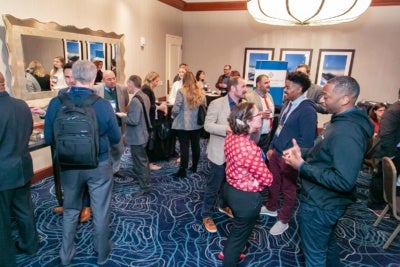On November 22, the Inclusive America Project participated in the 2019 annual meeting of the Association for Research on Nonprofit Organizations and Voluntary Action (ARNOVA) Conference by chairing a colloquium and hosting a reception. In a conversation titled “Civil Society and Religious Pluralism in a Polarized Nation,” Dr. Abbas Barzegar of the Council on American-Islamic Relations, Dr. Reginald Blount of Garret Evangelical Theological Seminary, Jihad Turk of Bayan Claremont Islamic Graduate School, and Dr. Matthew Scherer of George Mason University spoke with me, IAP Assistant Director, on the strengths of faith communities and the backlash many experience in the midst of America’s current state of polarization.
 America is famously religiously diverse, and as demographics continue to shift, religious diversity across the nation is rising. But, religious diversity alone does not equal pluralism and can, in fact, be dangerous. That danger typically falls on members of religious, racial, and ethnic minority communities. Recent rises in attacks, hate crimes, and violence against minority faith communities are not random, but are a result of organized and strategically funded efforts. Faith communities, and their associated civil society organizations, are centers of power – or as Robert Putnam says, “social capital.” As such, it shouldn’t be a surprise to us that the anti-pluralist pressure comes down hard on faith centers themselves. That pressure comes down not just on houses of worship but also at faith-based civil society institutions such as the Islamic Society of North America headquarters, which was vandalized a couple of years ago.
America is famously religiously diverse, and as demographics continue to shift, religious diversity across the nation is rising. But, religious diversity alone does not equal pluralism and can, in fact, be dangerous. That danger typically falls on members of religious, racial, and ethnic minority communities. Recent rises in attacks, hate crimes, and violence against minority faith communities are not random, but are a result of organized and strategically funded efforts. Faith communities, and their associated civil society organizations, are centers of power – or as Robert Putnam says, “social capital.” As such, it shouldn’t be a surprise to us that the anti-pluralist pressure comes down hard on faith centers themselves. That pressure comes down not just on houses of worship but also at faith-based civil society institutions such as the Islamic Society of North America headquarters, which was vandalized a couple of years ago.
The central question I asked of the panel was one of strategy:
Are those of us interested in promoting a thriving pluralism best served to lean into those centers of power, come what may of the backlash? OR, are we best served to do some kind of end run around the polarization by focusing on other connection points?
The response from the panel on this question was mixed, with the three panelists working in faith-based institutions all felt it was important to lean into their faith, claiming and naming it as part of their work. Dr. Blount said that any success among faith communities in promoting a thriving pluralism will “require continual collaboration, help, and support across all aspects of civil society.” Dr. Scherer did push back on the idea of focusing on religion as the identity around which to build pro-social work. Instead he argued that the complexities and intricacies in religion, democracy and polarization should be highlighted and analyzed. “It matters very much how we think about each of the terms involved in that complex,” he said, seeming to argue that attempting to make sense of the messiness and the complexity and getting it wrong will produce negative results.
Certainty we can agree with Dr. Scherer that “pluralism is a nearly infinite complex field of overlapping and interlocking identities and practices. This is a field that is highly unstable, and through which new inchoate formations are constantly coming into being and passing away in relation to one another.” We agree, too, that there is real danger in partaking in a feedback loop that could be negative overall.
IAP appreciates the need for caution and complexity, but we push back strongly on the idea that the complexity of a field should steer us away from engaging with it. Indeed, we agree that the field is largely unmapped, and we, along with our partners and friends, are working to close that knowledge gap. We are working to define the boundaries, challenges, and opportunities of the field of religious pluralism and build a coalition of partners to engage and develop it.
Data on the rise in Islamophobia and Anti-Semitic attacks show us without doubt that there is a desperate need to understand American religious diversity, and what minority faith communities are facing. There is a desperate need to ensure the faith groups and individuals support each other’s rights to practice and believe, or not to. Faith communities continue to hold immense organizing, mobilizing, and teaching power that is of the upmost importance to our pluralistic society. To use this “social capital” will require increased collaboration, religious literacy, anti-bias and anti-hate crime trainings, and opportunities for conversation to create a thriving religious pluralism.
I am so grateful for the time spent and the conversation had as the featured colloquium for the Values, Religion, Altruism, and Drawbacks track at ARNOVA last November. The discussion and reception attracted a variety of scholars and practitioners who were attending both ARNOVA and the America Academy of Religion (AAR) annual meeting to take part in the conversation. It is these conversations that give me hope amidst the onslaught of news stories of attacks against people of faith. As we roll into 2020, IAP we will continue to work with partners, practitioners, funders, thought leaders, academics, and friends to build the field of religious pluralism so that everyone is free and safe to worship, or not, according to their conscience.
Allison K Ralph is the Assistant Director of the Inclusive America Project.


